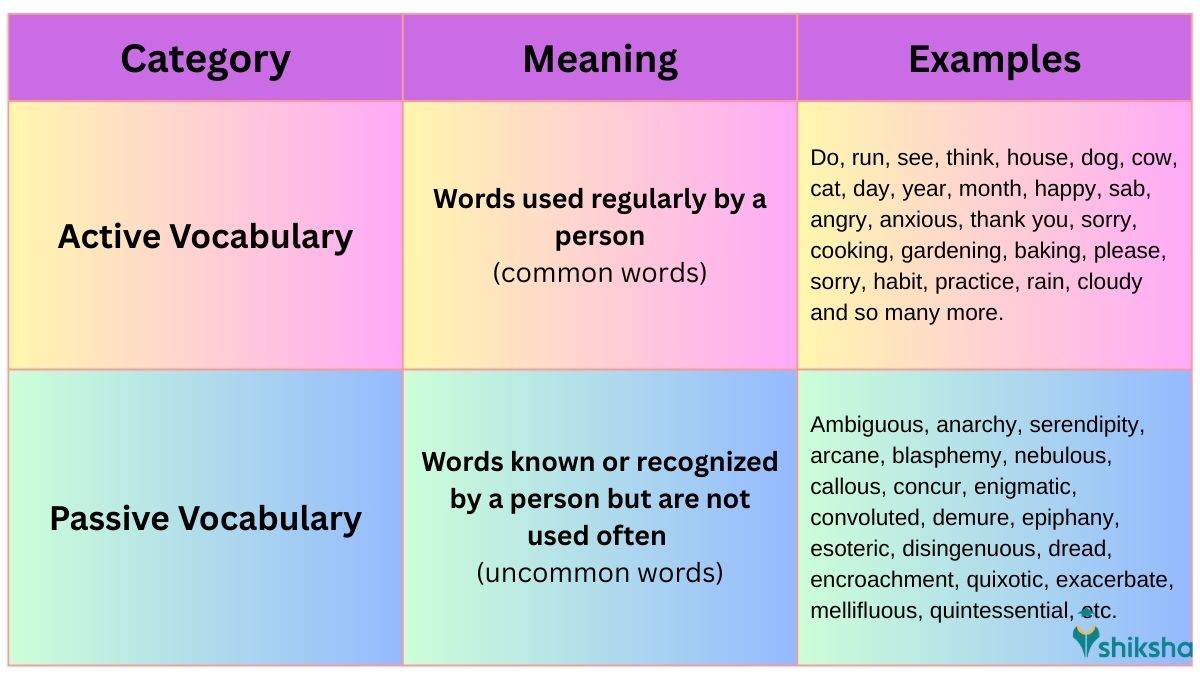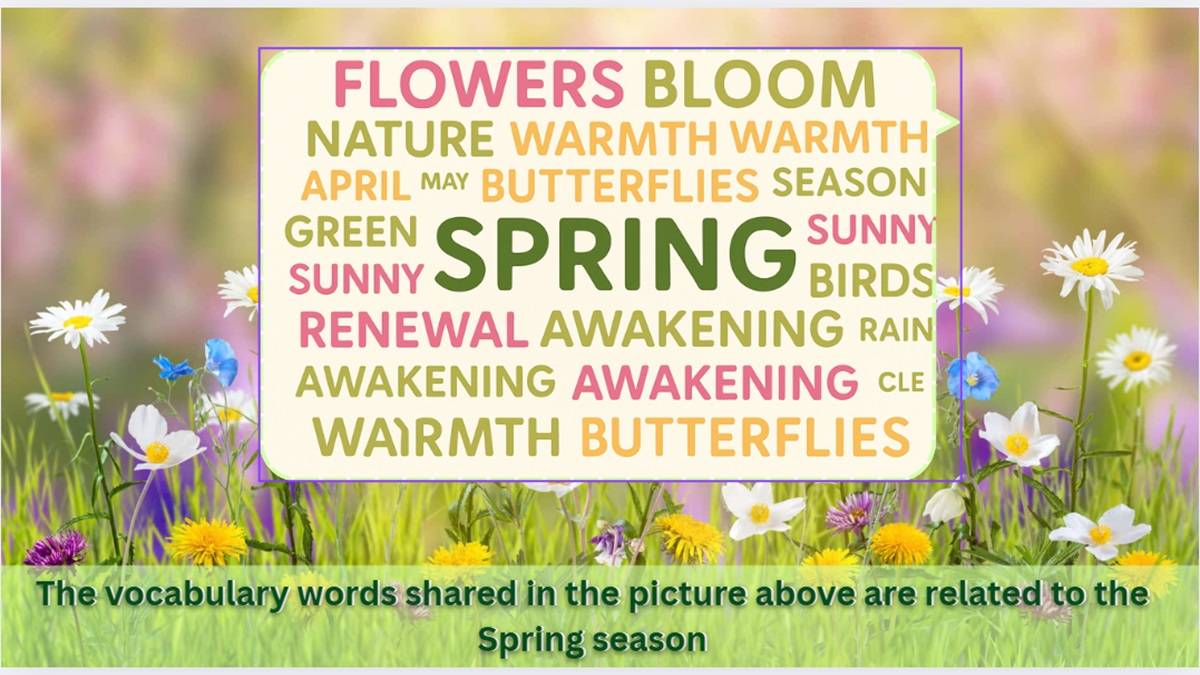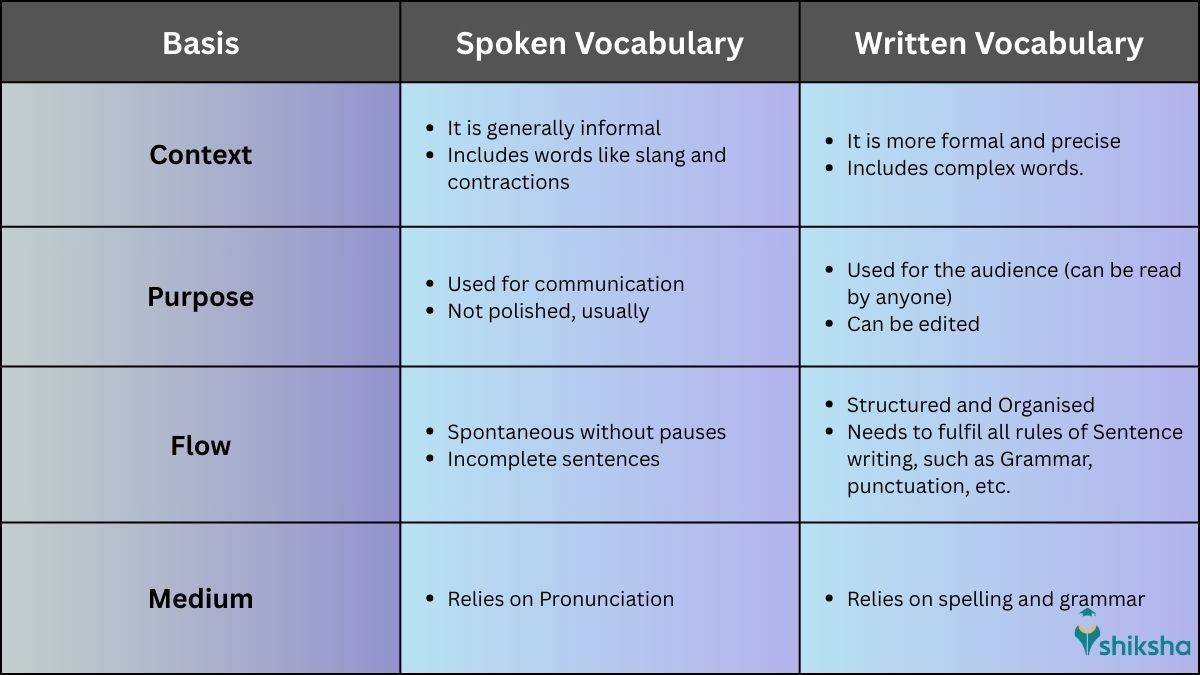
Vocabulary refers to all the words known and used by a person in a particular language. Vocabulary in English, specifically, is all the words that exist in the English language. There are millions of words in a language; a person may not know all the words. However, individuals can improve their vocabulary through reading, writing, listening, and other means. In a nutshell, it can be said that the vocabulary of a language is all the words contained in it. However, a person’s vocabulary is the total number of words he or she knows in a language.
New Vocabulary Words: Every year, new words are added to the English Dictionaries, such as Oxford, Cambridge, and Collins. This year, words like Skibidi, Delulu, Tradwife, Lewk, snackable, and thousands more have been added. Have a look at the meaning of these words below:
- Skibidi: It is used to describe something cool or bad. It originated from the YouTube series "Skibidi Toilet".
- Delulu: A slang term and a shortened form of being delusional
- Tradwife: Short form of traditional wife
- Lewk: A slang term and respelling of 'look'
- Snackable: Suitable for eating
Read further to know famous Vocabulary words and their meaning, types of Vocabulary in English Grammar and their usage in a sentence, examples and practice exercises with answers on vocab testing.
What is vocabulary and example?
Vocabulary is the set or words known and used by an individual. For example: My teacher has an amazing vocabulary. On the other hand, Vocabulary also refers to all the words in a language such as English. For example: Every year, new words are added into English Vocabulary.
Some of the common English Vocabulary words used in daily life are: come, go, eat, sit, hi, hello, good, bad, sit, up, down, give, have, get, stand, this, that, poor, rich, die, live, life, silence, noise, etc.
What is the full meaning of vocabulary?
Vocabulary is referred to as a list of all the words used in a particular language by individuals or group or in relation to a subject. Vocabulary in English is the list of words used in spoken and as well as written English language.
- What is Vocabulary?
- Definition of Vocabulary in English Grammar
- Categories of English Vocabulary Words
- Types of Vocabulary in English Language
- Examples of Vocabulary with Meaning: Normal & Advanced Words
- Vocabulary in Spoken and Written English
- How to Improve English Vocabulary?
- Best Books for English Vocabulary
- Vocabulary Exercises with Answers
- Related Topics of English Grammar
- FAQs on Vocabulary in English
What is Vocabulary?
Vocabulary, a noun word, is referred to as the collection of words known by a particular person. English Vocabulary also indicates the body of specific terms in a field of study, subject, activity or art, such as the vocabulary of dance. Here, vocabulary refers to the set of expressions and formations used in the dance art. Another example of the same is the vocabulary of Mathematics, which is all the words that are particularly used when discussing it.
Moreover, vocabulary as a subject comes in various competitive exams such as TET exams, SSC exams, UPSC exams, RRB exam and others.
Also Read: Prepositions in English
Commonly asked questions
What is basic vocabulary?
Basic vocabulary is a set of words that are used as everyday language and are common in written form as well. Humans commonly use these words to convey plethora of phenomenon of everyday use, such as:
- Daily routine such as eat, sleep and repeat
- Parts of body such as eyes, nose, etc.
- Natural resources such as water, air, etc.
- Environmental activities such as rains, clouds, heat waves, etc.
How to remember vocabulary words?
One can easily remember Vocabulary words by following these practices:
- Actively use the new words
- Apply their usage for communication
- Practice their usage using flashcards
- Learn these words in contextual sense
Definition of Vocabulary in English Grammar
Vocabulary Definition according to Collins Dictionary
- “a listing, either selective or exhaustive, containing the words and phrases of a language, with meanings or translations into another language; glossary”
- “the aggregate of words in the use or comprehension of a specified person, class, profession, etc.”
- “all the words contained in a language.”
- “a range or system of symbols, qualities, or techniques constituting a means of communication or expression, as any of the arts or crafts a wide vocabulary of textures and colours.”
Vocabulary Definition according to the Cambridge Dictionary
As per the Cambridge Dictionary, Vocabulary is defined as “all the words used by a particular person, or all the words that exist in a particular language or subject”.
Pronunciation: /vəˈkæb.jə.lər.i/ (vo·cab·u·lary)
Synonym: Lexicon
Abbreviation: Vocab
Plural: Vocabularies
Origin of Vocabulary word: It originated from the Medieval Latin word vocābulārium, which is from vocābulārius, concerning words.
Also Read: Types of Tenses
Categories of English Vocabulary Words
Vocabulary is an essential component of the English language and communication. It helps to express information, thoughts, emotions and ideas. It can be spoken, written, verbal or signed. It is largely categorised into two types: Active Vocabulary and Passive Vocabulary. Have a look at the details of these two categories of English Vocabulary with examples below.
Also Read: Verbs in English Grammar
Types of Vocabulary in English Language
Vocabulary words can be verbal, written, read, or listened to. There are four types of Vocabularies in the English Language – Listening, Speaking, Reading and Writing. Go through the details of these Vocabulary types in English below, along with the nicely explained Vocabulary examples.
Listening Vocabulary
The words a person needs to understand when someone is speaking fall under the Listening Vocabulary. For example:
The teacher asked students, “Prepare well for the Science test tomorrow.”
Here in the example stated above, students present in the class easily understood what teacher meant and what they need to do. These words in the sentence shared above are the Listening Vocabulary.
Speaking Vocabulary
The words used by people when they speak are the Speaking Vocabulary. For example:
While sitting among a group of friends, I said, “I am feeling famished.”
Here I, being the speaker, know what the English Vocabulary word famished means. However, the listeners might not relate with what the speaker said. In this case, feeling famished becomes Speaking Vocabulary for me.
Also Read: Synonym Words
Reading Vocabulary
Reading Vocabulary is the set of words one needs to understand when reading anything, such as books, newspapers, notes, etc. For example:
While reading the newspaper, I could not understand the sentence, “The ambiguity in the policy led to the confusion."
Here, the words ambiguity, policy, and confusion together make it impossible for me to understand what I read. Therefore, these words will not fall into my Reading Vocabulary as I failed to understand them. However, to improve my reading vocabulary, the reader may look up the dictionary for these words to know their meanings. This will not only improve the Vocabulary but will also improve the Reading Vocabulary.
Note: Reading Vocabulary is a very important part of the school curriculum, as well as often comes in various competitive exams in the form of ‘Reading Comprehension’. Questions on reading comprehension are not only asked in CBSE Class 10, CBSE Class 11 and CBSE Class 12, they also come in the following exams:
- SSC GD Constable exam
- CTET exam
- UPSC CAPF, CDS, NDA
- IBPS PO, Clerk
- SSC Exams
- SBI exams
- RRB Exams
Writing Vocabulary
Writing Vocabulary is the set of words one uses when writing something. For example, a person writing a letter to the MCD knows all the words he or she is writing and their meaning. All the words in that letter-writing fall under his or her Writing Vocabulary.
| Note: The vocabulary words that fall in types such as reading, writing, listening and speaking and categories such as Active and Passive vary from person to person. |
Examples of Vocabulary with Meaning: Normal & Advanced Words
In English, majorly all the commonly used words have their synonyms, which are just advanced words with the same meaning. The table below contains the common words and their advanced versions, along with the meaning and examples. Look at the examples of Vocabulary words with their meaning and know the usage of vocabulary in a sentence below:
| Common Word |
Advanced Word |
Meaning |
Example in a Sentence Form |
|---|---|---|---|
| Walk |
Stroll |
to move or go by putting one foot in front of the other on the ground |
He went for a walk/ stroll in the park. |
| Run |
Sprint |
to move or go somewhere using your legs, faster than walking |
I had to run faster to finish first in the race./ I had to sprint harder to finish first in the race. |
| See |
Perceive |
to look at something using your eyes through the power of sight |
Babies can see objects from birth./ Babies can perceive objects from birth. |
| Look |
Glance |
to turn your eyes in a particular way to pay attention to something or somebody |
He glanced at his watch./ He looked at his watch. |
| Think |
Ponder |
To use the mind to have an idea or an opinion about something |
After reading the essay, I found myself pondering over/ thinking about the writer’s mindset. |
| Feel |
Sense |
to be in the state that is stated when you touch, see, smell or experience something |
I could feel/ sense something was wrong. |
| Go |
Proceed |
to travel from one place to another |
The teacher asked us to go to the playground./ The teacher told us to proceed to the playground. |
| Stop |
Halt |
to some to an end or to finish something |
An accident stopped/ halted the traffic on this lane. |
| Live |
Exist |
To have life or to stay alive |
Anaconda is one of the largest snakes that has ever lived/ existed. |
| Die |
Expire |
To stop living or existing |
He died/ expired at the age of 89. |
| Sleep |
Nap |
state of rest of the body when eyes are closed and the mind and body are unconscious or not active |
After lunch, I need a sleep/nap of 15 minutes to refresh. |
Apart from these, there are millions of words with similar meaning or Synonyms in English that one can know by simply referring to the dictionary or online platforms like Google or Chatgpt. Have a look at an example below:
Also Read: Rules of English Articles
Vocabulary in Spoken and Written English
There are different Vocabulary words in spoken and written English. The words that we speak or hear in communication or conversations are Spoken Vocabulary, and the words we use while writing texts, such as essays, messages, books, sentences, etc., fall under Written Vocabulary. Have a look at the difference between the two below:
Knowing and understanding the differences between spoken and written language, one can improve his or her communication skills in both forms.
Also Read: What is Precis Writing?
How to Improve English Vocabulary?
Anyone can enrich their Vocabulary in English at any point in their life. There are several ways to improve the English Vocabulary, such as by reading more, writing practice, keeping notes and others. Have a look at some of the best ways to improve vocabulary below:
- Read Extensively: Reading, in general, is a one-person activity to progress in word power. One can easily improve his or her word knowledge by reading widely. The medium can be anything that you enjoy, such as reading literature, fictional books, non-fictional books, newspapers, journals, research projects, textbooks, blog posts, etc.
- Maintain a Vocabulary Journal: One of the best ways to memorise the new words or vocabulary is by keeping a note of them. Write down every new word you come across, along with its meaning and examples, so that you retain it in your memory.
- Implementation in Conversation: Practice the new words or vocabulary in day-to-day conversations with people around you. This will make you familiar with the usage of these words and boost your confidence as a good speaker.
- Watch English Movies & TV Shows: The most immersive experience to learn new words is by watching something that entertains you. One can easily resort to watching English movies and TV shows, listening to podcasts and interviews to become more familiar with the language.
- Play Word Games: Playtime is a fun way to expand the English Vocabulary. There are several games that strengthen the English word power such as scrabble, crossword puzzles, Boggle, etc.
- Use Writing as a Practice Tool: Use the new vocabulary words by making new sentences or writing paragraphs. You can improve your writing skills by simply penning down your thoughts, writing an essay, practising letter-writing or composing new sentences using the new words.
Also Read: Active and Passive Voice Rules
Best Books for English Vocabulary
Vocabulary Exercises with Answers
Related Topics of English Grammar
FAQs on Vocabulary in English
Commonly asked questions
How to improve vocabulary?
Anyone at any stage can work on improving their English Vocabulary. To improve vocabulary, follow these easy ways:
· Read newspapers, books, novels, etc.
· Make notes of new words along with their meanings.
· Use the newly learnt words in everyday communication, wherever applicable.
· Watch English shows, movies, podcasts, etc.
· Play puzzles and word games such as crossword, scrabble, etc.
What is basic vocabulary?
The most commonly or frequently used words in English language are basic vocabulary. These basic words can be parts of speech in English Grammar such as nouns, pronouns, verbs, adjectives, prepositions, conjunctions, adverbs, etc. These words are used for communication and conversations and are easily understandable by speakers and listeners. For example, English words like eat, sleep, repeat, cat, dog, big, small, slow, quick, is, are, the, a, an, and, with, between, among, etc., are all part of basic vocabulary.
What is Vocabulary in Education?
In Education domain, Vocabulary are the words in English Language that students must know to understand the texts. Knowing vocabulary is important and one of the major contributors when it comes to answering the questions on Reading Comprehension or Unseen Passage. It not only helps the students at school level but also helps the aspirants or candidates who take competitive exams such as SSC exams, UPSC exams, RRB exams, IBPS exams, etc.
What are 10 Vocabulary words with meaning?
Have a look at the 10 vocabulary words with meaning below:
· Persevere – To continue to do something
· Slumber – Sleep
· Abhorrence – To hate
· Nocturnal – Active at night or something happening during the night
· Diminutive – Very small
· Raucous – Loud and noisy
· Obscure – Not well known/ not easy to understand
· Serene – calm and peaceful
· Ditz – A person who forgets or who does not think clearly or practically
· Colossal – Extremely large
English Vocabulary Exam
Student Forum
Other Topics under this Chapter
Other Class 10th English Chapters
- English Past Tense
- English Idioms
- English Punctuation
- English Analogy
- English Interjections
- English Prefixes
- English Adjectives
- English Future Continuous Tense
- English Letter Writing
- English Suffix
- English Grammar
- English One Word Substitution
- English Mood
- English Direct and Indirect Speech
- English Figures of Speech
- English Composition
- English Para Jumbles
- English Reading Comprehension
- English Sentences
- English Auxiliary and Modal Verbs
- English Formation of Words
- English Precis Writing
- English Nouns
- English Adverbs
- Conjunctions
- English Prepositions
- English Verbs
- English Paraphrasing
- English Articles
- English Subject and Predicate
- English Pronouns
- English Tenses
- English Active and Passive Voice
- English Vocabulary
- English Subject Verb Agreement
- English Phrases
- English Synonyms
- English Etymology and Roots
- English Spelling Rules
- English Parts of Speech
- English Gerunds



